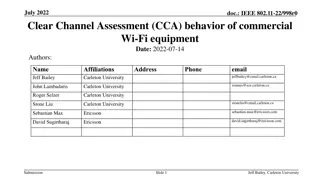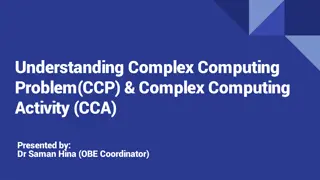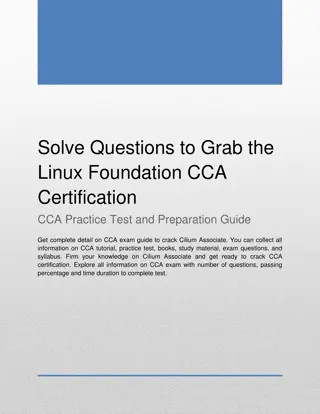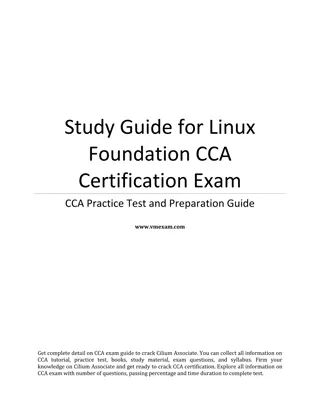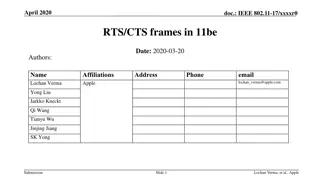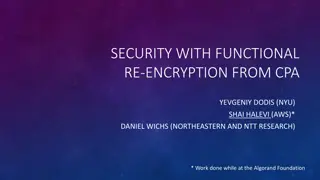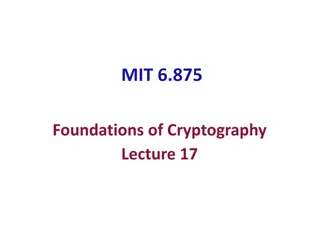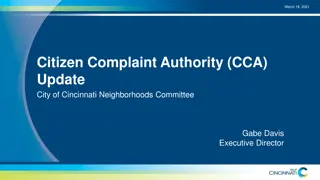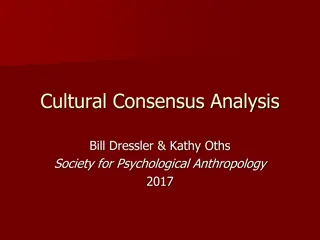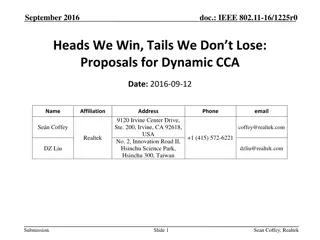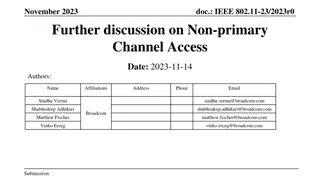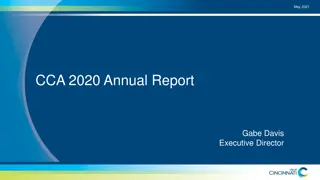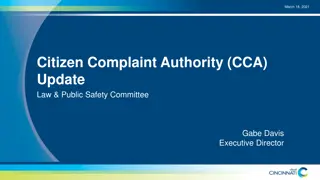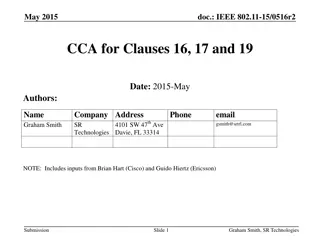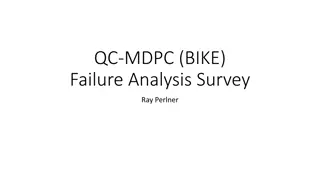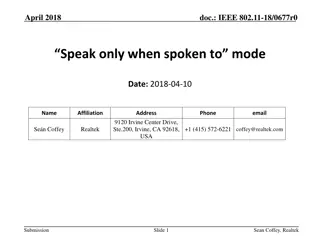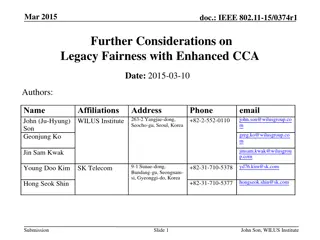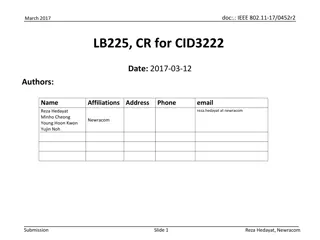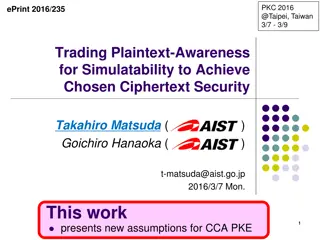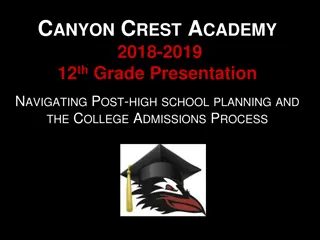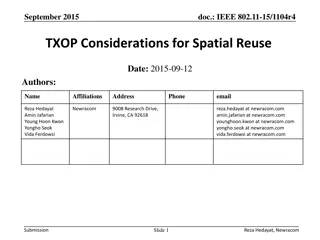Clear Channel Assessment (CCA) Behavior of Commercial Wi-Fi Equipment
This document, dated July 2022, delves into the Clear Channel Assessment (CCA) behavior of commercial Wi-Fi equipment in response to Narrowband Frequency Hopping (NB FH) signals. It explores the regulatory framework around license-exempt frequency bands in the USA and Europe, highlighting the specif
0 views • 22 slides
Understanding Complex Computing Problem (CCP) and Complex Computing Activity (CCA)
Dr. Saman Hina, along with Dr. Farrukh Arif and Dr. Maria Waqas, presents information on Complex Computing Problem (CCP) - a problem involving technical, computing, and other issues with no obvious solution, requiring deep knowledge and analytical thinking. CCP is evaluated through predefined rubric
4 views • 19 slides
Solve Questions to Grab the Linux Foundation CCA Certification
Click Here--- \/\/bit.ly\/4ddu2cK ---Get complete detail on CCA exam guide to crack Cilium Associate. You can collect all information on CCA tutorial, practice test, books, study material, exam questions, and syllabus. Firm your knowledge on Cilium A
0 views • 9 slides
Study Guide for Linux Foundation CCA Certification Exam
Click Here--- \/\/bit.ly\/4ddu2cK ---Get complete detail on CCA exam guide to crack Cilium Associate. You can collect all information on CCA tutorial, practice test, books, study material, exam questions, and syllabus. Firm your knowledge on Cilium A
0 views • 8 slides
Implications of Large-size RU Aggregation on RTS/CTS in IEEE 802.11-17
Addressing implications of large-size RU aggregation on RTS/CTS in IEEE 802.11-17, focusing on the signaling of Enhanced High Throughput Format PPDU Bandwidth and puncturing in RTS/CTS frames. Proposing the use of HE MU-RTS Trigger frame to elicit CTS response from STAs, along with different CTS for
4 views • 17 slides
Security with Functional Re-Encryption in Cryptography
Exploring the concept of functional re-encryption from the perspective of security in encryption schemes lies between CPA and CCA security levels. The work done by Yevgeniy Dodis, Shai Halevi, and Daniel Wichs delves into how functional re-encryption can enhance the security and privacy of encrypted
0 views • 12 slides
Evolution of Proofs in Cryptography
Cryptography has evolved from classical proofs to interactive and probabilistically checkable proofs, enabling the development of applications like Non-Malleable and Chosen-Ciphertext Secure Encryption Schemes. Non-Malleability protects against active attacks like malleability and chosen-ciphertext
0 views • 29 slides
Hardness of Proving CCA-Security in Signed ElGamal
Bogdan Warinschi from the University of Bristol, along with David Bernhard and Marc Fischlin, discusses the challenges in proving the chosen-ciphertext security of signed ElGamal encryption schemes. The potential solution involves adding a proof of knowledge to ciphertexts to prevent adversaries fro
0 views • 26 slides
Graduation Requirements and Academic Guidance at Hinkley High School
Hinkley High School requires 22 credits for graduation, with different credit values assigned for passing classes per quarter and year. Students must pass every class to graduate. The curriculum includes credits for subjects like Language Arts, Math, Science, Social Studies, Foreign Language, and El
0 views • 15 slides
Citizen Complaint Authority (CCA) Overview in City of Cincinnati Neighborhoods
Citizen Complaint Authority (CCA) in City of Cincinnati focuses on investigating serious police interventions, resolving citizen complaints fairly, and improving police services. With a clear mission statement, organizational structure, and detailed investigation process, CCA aims to address citizen
0 views • 32 slides
Understanding Cultural Consensus Analysis in Psychological Anthropology
Explore the essence of Cultural Consensus Analysis (CCA) as a significant aspect of psychological anthropology. Through ethnographic work and structured techniques, CCA helps verify shared knowledge within cultural domains and enhance the comprehension of cultural models. The model and steps involve
0 views • 64 slides
Strengthening the CCA Program Through Targeted Marketing Strategies
Utilizing well-designed email campaigns and personalized marketing materials, the CCA Program aims to re-engage lapsed CCAs and attract new candidates. By showcasing testimonials and collaborating with local boards, the program seeks to enhance its reach, credibility, and impact globally.
0 views • 11 slides
Enhancing Power Save Mechanisms in IEEE 802.11 for Non-AP STAs
The document discusses improving power save mechanisms for non-AP STAs in IEEE 802.11 by focusing on reducing power consumption during listen mode, enhancing flexibility in transitions between power states, and proposing solutions to enable reception on smaller bandwidths. It emphasizes the importan
0 views • 11 slides
Proposing Dynamic CCA Control for Performance Optimization in WLAN
This presentation discusses the variability in dynamic CCA performance in WLANs and proposes a protocol control mechanism to maximize benefits and minimize drawbacks. It emphasizes the need for an effective control to navigate differing configurations and achieve system throughput improvements witho
0 views • 21 slides
Further Discussion on Non-primary Channel Access in IEEE 802.11
This contribution delves into the utilization of non-primary channels for access in IEEE 802.11 networks, focusing on enhancing frequency reuse, adhering to ETSI standards, evaluating CCA capability types, and analyzing non-ideal deployment scenarios. It discusses the complexity and benefits of non-
0 views • 26 slides
CCA 2020 Annual Report Analysis - Key Findings and Trends
The CCA 2020 Annual Report highlights key findings and trends related to citizen complaints, allegations, and demographics. It presents data on complaint trends, allegation types, complaint resolutions, and complainant demographics over a five-year period. The report offers insights into the perform
0 views • 19 slides
Citizen Complaint Authority (CCA) Overview and Mission Statement
The Citizen Complaint Authority (CCA) is committed to investigating serious interventions by police officers and resolving citizen complaints in a fair and efficient manner. Their ultimate goals include addressing citizen concerns and improving perceptions of police service in Cincinnati. The organi
0 views • 31 slides
Proposed Changes to CCA Schemes in IEEE 802.11 Standards
The submission discusses proposals to enhance the Clear Channel Assessment (CCA) schemes for IEEE 802.11 standards, particularly focusing on Clauses 16, 17, and 19. It addresses the current limitations in CCA schemes for different devices and suggests modifications to ensure compliance and efficient
0 views • 13 slides
Climate Change Adaptation Technical Working Group Session Summary
The Climate Change Adaptation (CCA) Technical Working Group session, led by Mr. Noel Antonio Gaerlan, provided updates on focal points, partners, status of the 2019 workplan, decisions endorsed by SOM, proposed workplan for 2020, and recommendations for SOM consideration. Key activities included wor
0 views • 9 slides
BIKE Cryptosystem: Failure Analysis and Bit-Flipping Decoder
The BIKE cryptosystem is a code-based KEM in the NIST PQC standardization process, utilizing the Niederreiter variant of the McEliece Construction with a QC-MDPC code. It ensures security against IND-CPA, and efforts are made to further confirm or disconfirm its estimates for IND-CCA security requir
0 views • 14 slides
IEEE 802.11-18/0677r0: Speak-Only-When-Spoken-To Mode in Wireless Networking
This document discusses the implementation of a speak-only-when-spoken-to mode in IEEE 802.11-18/0677r0 for managing various devices within wireless networks. It highlights the benefits of this mode for maintaining throughput efficiency and coexistence, especially in scenarios involving 11b-only dev
0 views • 7 slides
Legacy Fairness Enhancement in IEEE 802.11 Networks: Further Considerations
Investigating legacy fairness issues in IEEE 802.11 networks, this document explores methods to address throughput starvation of legacy stations due to enhanced Channel Clear Assessment (CCA) in High Efficiency (HE) stations. Two fairness methods, Legacy Frame Protection and PPDU Size Reduction, are
0 views • 9 slides
Understanding Legacy CCA and OBSS-PD Rules in IEEE 802.11-17 Standard
The document discusses the Legacy Clear Channel Assessment (CCA) rule and OBSS Packet Detection (PD) rule in the IEEE 802.11-17 standard. It highlights the shortcomings of the existing CCA mechanism and proposes exceptions for response frames to prevent interference issues in wireless communications
0 views • 16 slides
New Assumptions for Achieving Chosen Ciphertext Security in Cryptography
This research work focuses on presenting new assumptions for achieving chosen ciphertext security in public key encryption. The study aims to clarify the necessary and sufficient assumptions to realize general cryptographic primitives, particularly focusing on CCA secure PKE and KEM. The ultimate go
0 views • 27 slides
Navigating Post-High School Planning and College Admissions Process at Canyon Crest Academy
Navigating post-high school planning and the college admissions process at Canyon Crest Academy involves staying informed about upcoming events, creating a college list, understanding admission processes for community colleges, CSU, UC, private, and out-of-state universities, and familiarizing onese
0 views • 27 slides
IEEE 802.11-15/1104r4: Optimizing CCA Threshold for Spatial Reuse in WLANs
The document discusses considerations for optimizing the Clear Channel Assessment (CCA) threshold in wireless local area networks (WLANs) to enhance spatial reuse efficiency. It emphasizes minimizing over-protection caused by the current CCA rule while addressing factors like frequency reuse, BSS/OB
0 views • 18 slides
